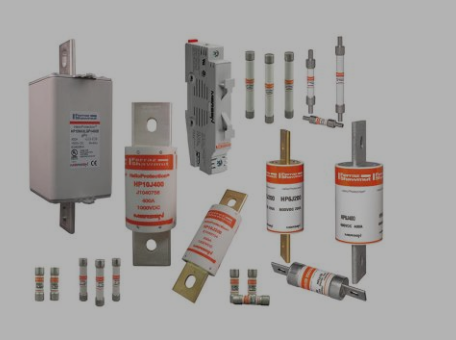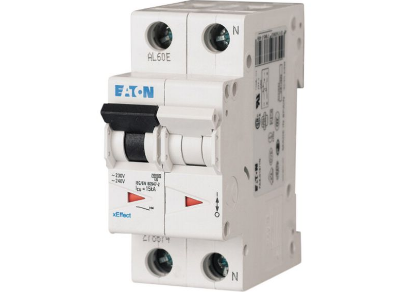What Is a Fuse?
In electrical, a fuse is an essential device used in various electrical circuits which gives the protections from the over-current. It is made up of a thin strip or strand of metal, so that, whenever the heavy amount of current or an excessive current flow is there in an electrical circuit, the fuse melts and it opens the circuit and disconnects it from the power supply. Fuses are always connected in series with the component(s) to be protected from overcurrent, therefore when the fuse blows (opens) it will open the entire circuit and stop current through the components.
Fuses are used for the protection of home appliances, computers, television, radios and other essential devices from the short circuit and damage by overload or high current. It can also be used in protection of:
- Game systems
- Scanners
- Motors and transformers
- Printers
- Power converters
- DVD players etc
Fuses can be divided into two main categories according to the type of input supply voltage. That is:
- AC fuses
- DC fuses
Fuses are further categorized based on one time or multiple operations. They include:
- Cartridge fuses
- High voltage fuses
- Low voltage fuses
- Rewirable fuses
- Thermal fuses
- Resettable fuses
- Switch fuse
- Striker fuse
- Drop-out fuse
What You Need To Know About Fuse
- A fuse is a short piece of wire or thin metal strip that can protect the electrical circuit against the excessive current flow or overload conditions.
- Operation of fuse is independent of ambient temperature.
- Fuses works on principle of electrical and thermal properties of the conducting materials.
- The fuses performs both detection and interruption process.
- Mode of operation of fuse is typically automatic.
- Fuses once used cannot be re-used again.
- Fuse cannot be used as an ON/OFF switch.
- The fuse provides protection against power overloads only.
- The characteristic curve of the fuse shifts because of the ageing effect and as a result, it causes nuisance and tripping.
- Fuses are used extensively in electronic equipment’s which draw low current.
- Fuse is replaced manually after operation.
- Operating time of fuse is very less about 0.002 second.
- Breaking capacity of the fuse is low as compared to that of a circuit breaker.
- No auxiliary contact is required in case of fuse.
- The cost of fuse is comparatively low to that of circuit breaker.
What Is a Circuit Breaker?
An electrical circuit breaker is a switching device that can be operated manually or automatically for controlling and protecting the electrical power system. The circuit breaker is mainly designed for closing or opening of an electrical circuit, thus protecting the electrical system from damage. The circuit breaker is an absolutely essential device in the modern world and one of the most important safety mechanisms in your home. Without a circuit breaker, there is a high risk of electrical fires, electrocution and electrical shocks.
Circuit breaker essentially consists of fixed and moving contacts. These contacts are touching each other and carrying the current under normal conditions when the circuit is closed. When the circuit breaker is closed, the current carrying contacts, referred to as electrodes, engaged each other under the pressure of a spring.
There are different types of circuit breakers which are based on voltage, installation location, external design and interrupting mechanism.
Based on voltage
- Low voltage circuit breaker
- High voltage circuit breaker
By installation location
- Indoor circuit breakers
- Outdoor circuit breakers
Based on external design
- Dead tank circuit breaker
- Live tank circuit breakers
By interrupting mechanism
- Vacuum circuit breakers
- MCCB (Moulded Case Circuit Breakers)
- Single pole circuit breaker
- Double pole circuit breaker
- Air circuit breaker
- Oil circuit breaker
What You Need To Know About Circuit Breaker
- A circuit breaker is an automatically operated electromechanical switch that can protect an electrical circuit against overload and short circuit conditions.
- Operation of a circuit breaker is dependent on ambient temperature.
- Circuit breaker works on the electromagnetism and switching principle.
- Circuit breaker performs only interruption process; a relay system is attached for detection of any fault in the circuit.
- Circuit breakers can be operated manually as well as automatically with the help of a relay system.
- Circuit breakers once used can be re-used hence there is no need to change the circuit breaker after any fault takes place and the coil is stripped.
- Circuit breaker can be used as an ON/OFF switch.
- Circuit breaker provides protection for both power overloads and short circuits.
- The characteristic curve of the circuit breaker does not shift.
- Circuit breakers are used in power equipments such as in motors and other heavy machines which draw a large amount of current.
- Circuit breaker is reset quickly after operation.
- Operating time of a circuit breaker is comparatively more than that of the fuse. It is between 0.02-0.005 seconds.
- Breaking capacity of a circuit breaker is high when compared to that of fuse.
- In circuit breaker, auxiliary contact is required.
- The cost of circuit breaker is comparatively high to that of fuse.
Also Read: Difference Between Relay And Contactor
Difference Between Fuse And Circuit Breaker In Tabular Form
| BASIS OF COMPARISON | FUSE | CIRCUIT BREAKER |
| Description | A fuse is a short piece of wire or thin metal strip that can protect the electrical circuit against the excessive current flow or overload conditions. | A circuit breaker is an automatically operated electromechanical switch that can protect an electrical circuit against overload and short circuit conditions. |
| Operation | Operation of fuse is independent of ambient temperature. | Operation of a circuit breaker is dependent on ambient temperature. |
| Working Principle | Fuses works on principle of electrical and thermal properties of the conducting materials. | Circuit breaker works on the electromagnetism and switching principle. |
| Function | The fuses performs both detection and interruption process. | Circuit breaker performs only interruption process; a relay system is attached for detection of any fault in the circuit. |
| Mode of Operation | Mode of operation of fuse is typically automatic. | Circuit breakers can be operated manually as well as automatically with the help of a relay system. |
| Reusability | Fuses once used cannot be re-used again. | Circuit breakers once used can be re-used hence there is no need to change the circuit breaker after any fault takes place and the coil is stripped. |
| Alternative Use | Fuse cannot be used as an ON/OFF switch. | Circuit breaker can be used as an ON/OFF switch. |
| Protection | The fuse provides protection against power overloads only. | Circuit breaker provides protection for both power overloads and short circuits. |
| Characteristic Curve | The characteristic curve of the fuse shifts because of the ageing effect and as a result, it causes nuisance and tripping. | The characteristic curve of the circuit breaker does not shift. |
| General Application | Fuses are used extensively in electronic equipment’s which draw low current. | Circuit breakers are used in power equipments such as in motors and other heavy machines which draw a large amount of current. |
| After Operation | Fuse is replaced manually after operation. | Circuit breaker is reset quickly after operation. |
| Operating Time | Operating time of fuse is very less about 0.002 second. | Operating time of a circuit breaker is comparatively more than that of the fuse. It is between 0.02-0.005 seconds. |
| Breaking Capacity | Breaking capacity of the fuse is low as compared to that of a circuit breaker. | Breaking capacity of a circuit breaker is high when compared to that of fuse. |
| Auxiliary Contact | No auxiliary contact is required in case of fuse. | In circuit breaker, auxiliary contact is required. |
| Cost | The cost of fuse is comparatively low to that of circuit breaker. | The cost of circuit breaker is comparatively high to that of fuse. |
Advantages of Fuses
- It is the cheapest form of protection and does not require any form of maintenance.
- Operation of fuse is simple and no complexity is involved.
- It is capable of current limiting effect under short-circuit conditions
- Fuse has the ability to interrupt enormous short circuit current without producing noise, flame, gas or smoke.
- Fuse inverse time current characteristic has the ability to use for over-load protection.
Advantages Of Circuit Breakers
- It is very sensitive in its operation
- It is more reliable.
- The circuit operates in the safest manner on its own.
- Circuit breaker does not require any replacement unlike a fuse or any other safety device.
- It automatically retains its connections and the circuit starts to operate again.
- There is no attaching and reattaching of the contacts manually.
Also Read:


Comments are closed.